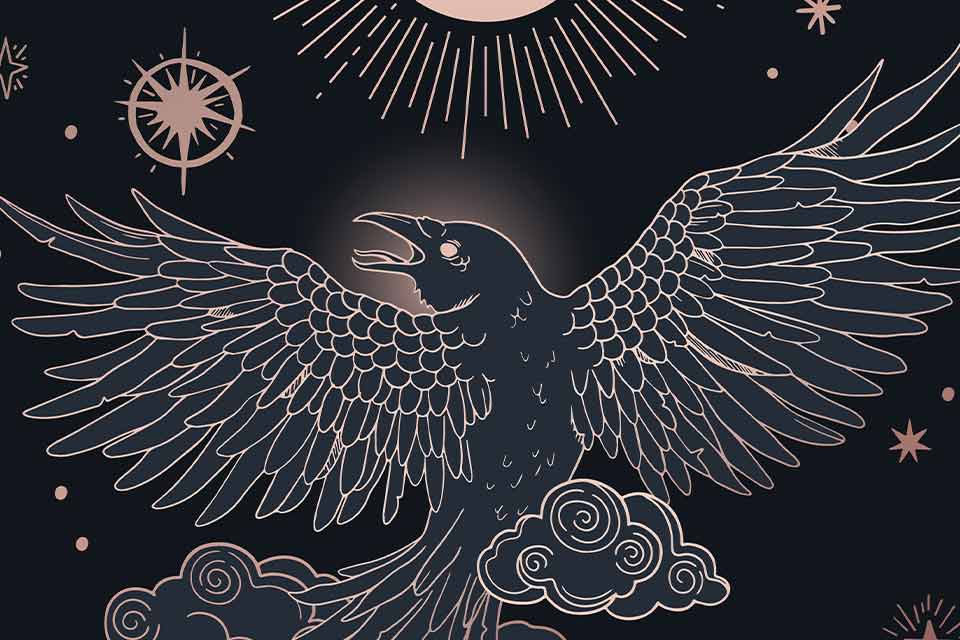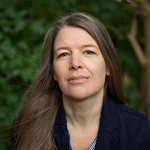They Flew by Night

I. Northward
January 2, Arrival
By night they flew, korvat kuin korpit, ears like ravens, who hear a bark. They listened to the forest rustling; to the storms in the woods. Crowns of conifers, webs of branches bustling in the dark.
Over the continent webs lustred while the earth was asleep. Northward the ravens followed linnunrataa, the pathway of the birds in the night sky. They did not see a skylark in the comet’s splattered stream, nor half a finch in the stardust. No whisper of a wagtail in the cosmic whirl, not even a swallow’s wing in the galactic sweep. Ears like a raven, who hears a bark. The ravens did not turn back.
On the same night, Aava booked a flight in the internet’s pale glow.
The plane thundered along electronic routes over shores and seas.
Aava landed on the runway, and so she traveled directly onward, in a train.
Tammikuu, January
It was a land of wealds and water through which Aava traveled in a train, on a winter’s day so windless that it appeared as if through a liquid lens. The rail lines followed shorelines northward. Lakes reposed in tangled bosks. Shores appeared and disappeared. The rail lines steered the train through the afternoon. In the smooth water, a reflection of the woods. World and netherworld met each other on the strand: maa and manala. Janus-faced, about-faced.
In the window glass Aava’s face ghosted like a gauze. Veil-like, it glided across the land. Her cheeks sweeping through fir trees. The corners of her mouth sinking into the silent seam of the shores. Aava felt soft as silk on that afternoon, in a train.
In H., the cold wrapped itself around her. She yanked her suitcase away, away from the station up the hill to the hotel. The suitcase’s rollers rattling. Darkness from the trees penetrated the pools of light from the lamps. The walkway wound in the incline beneath her numb feet, where the night had already sunk its teeth.
Aava stabbed a slender key into the room door. She slid the leaden lock. The suitcase swept over the threshold onto the carmine carpet. The carpet swallowing her steps. The window watched her while the furniture withdrew. Aava sat in the seat. For how long? Silence settled over her.
I’m seeking a spot where rings ripple over still water and hooks hang in the deep.
I’m seeking the fishing grounds of my elders’ eye. The place that drove my grandfathers from their beds at night when the fish were biting. I’m seeking a spot where rings ripple over still water and hooks hang in the deep. I’m not journeying into the unknown. I’m journeying to my ancestors’ home. I’m seeking the fishing grounds of my mind’s eye, Aava said to the cold twin on the other side of the window.
Two nights later, a thin sheet of ice sealed lakes, bays, and shores. The water was gone. The harbormaster recorded the date. The cold spread. Sheet by sheet, it fed the thin ice.
The ice thickened and awoke with a snap. It stretched, shivered, and strengthened again. Each day it grew deeper and, for a short while, reflected the shine of the distant sun back into the sky. White forms wove through the black surface of the ice: branching, fingerlike, beakoid shapes and lines that bespoke the slow, all-pervading frost.
In the morning darkness, tradesmen hurried with speedy steps and heavy shoes through the hotel corridors and through Aava’s half-sleep. As it grew light, Aava went down for breakfast, but the vacuum sweeper was already screeching in the dining room. Lunch was being cleared away as Aava stepped into the tavern. In the afternoon, when she stood in the frosty air outside the hotel, all muffled up for a stroll, the sun was setting. Dusk gathered like a drawstring bag; day folded into night.
Aava endured. She clicked the lamps on. In the window, walls and furnishings emerged out of the frost. The room cast a side room into the night. A dim chamber appeared. Someone was walking around in it, to all appearances herself. Aava extinguished the lamps. Kuun sirppi, the crescent moon, hung in the bare, black birch crowns.
Night after night, the moon rises later, Aava noted.
It grows smaller and retreats ever further.
A choice looms in the heavens: tungsten light or darkness.
On the shores, paws, claws, and feet took their first steps upon the ice. A woman cowered naked beside an ice hole and poured water over her shoulders and back. A moment long, she stood on the frozen lake and gazed at the sky, where dark blue was gathering momentum against the fading light from the setting sun. Then she pulled on her boots and cloaked herself in a towel.
The temperature escaped the grip of the cold and took flight toward freezing point. Snowfall started.
The snow fell over ground for days, only pausing briefly. Fell and fell for a few hours of dull daylight and continued swirling in the darkness: quiet and constant. On the spindly, naked shrubs in front of the window bloomed ridges of frost and beards of snow. The golden stalks shrouded themselves in white fur. There was nothing to do. Snow was falling, that was all.
The people’s steps grew quieter.
Aava vanished under the covers.
Languished under the covers.
Let herself be snowed in.
Slept and slept.
Outside the wind whipped cold over the bridge that connected the two halves of H. and spanned the ravine in the middle of the village. The snowplow scraped its way over the road, flashing in the twilight. The cold clung to the earth. Layer by layer, the ice bit deeper into the bodies of water, the lakes.
Heavy as lead, Aava sank deeper, also into her body.
Heavy as lead, Aava sank deeper, also into her body. She fell and fell to under her navel and further, until she hit a place that must have been the nadir. Far above, she saw an opening shimmering, a shimmying round, a sound. The place talked in a tongue that she understood in a trice. This far and no further.
Several times the phone rang.
Aava covered her ears.
Then she ran out of sleep.
Under the covers, she gnawed on dried berries and biscuits from breakfast, and all flavors of licorice left in the bag. She thought, but the thoughts moved lethargically as if they too were wading through snow. The emergency rations had been used up, faster than she had imagined.
On a pale arm, a hand with black painted fingernails emerged from under the covers. Grabbed the telephone. She rasped.
It’s Aava.
Translation from the German
Translator’s Note
by Catherine Venner
Last March, after a bitterly cold but mainly snowless English winter, I felt a mixture of yearning for a “real” winter and sorrow for missing its glistening glory. So when I happened upon Mirja Lanz’s debut, Sie flogen nachts, it was with delight that I was transported alongside the main protagonist, Aava, to a fairy-tale-esque winter in the Finnish lakes. I instantly fell in love with the writing, I instantly knew I wanted to translate it, and I instantly sensed it would be challenging.
And while I was being charmed by the vivid, enchanting winterscapes, bringing to life “ridges of frost and beards of snow,” I slowly came to realize that Mirja Lanz was not only painting a beautiful picture but was accompanying it with her own symphonic world of words.
The Finnish expressions for natural phenomena provide an early clue that the sounds of the words are just as important as their meanings. For example, linnunrataa or the Milky Way, dreamily glossed as “the pathway of the birds in the night sky,” tones so distinctly Finnish that our ears fly with the ravens to the shores of the conifer-lined Nordic lakes.
Lanz’s skillful use of euphony to create atmosphere does not stop at a sprinkling of foreign words. On closer reading, we delve into a treasure trove of rhymes, half-rhymes, alliteration, and onomatopoeia. When I sat down to translate, I found myself reading out loud, first in German and then in English, word by word, sentence by sentence, feeling the weight and timber of each in my mouth and in my ear.
English being part of the Germanic family is an advantage of this language combination because words in both tongues often have the same tonal stem. Thus leuchteten (to glow) became lustered, reflecting the sense and the cadence at the start of the verb. Wald und Wasser became wealds and water, maintaining both the “w” alliteration running through the sentence and also the definition. As an archaic word, weald is rooted in Old English and related to Old High German, once again highlighting the commonality of these Germanic tongues.
Of course, even in related languages translation is not simply pasting one word over another with a similar sound and meaning, if indeed one such word exists. And in the deep and rich prose of Sie flogen nachts, I also came across intriguing conundrums, such as the German Ahnen (ancestors) and Ahnung (notion) that required some thinking around to achieve both the recurrence of the initial sound but also the difference in meaning. I eventually settled on moving the repetition to the end of the term (rendering them of my elders’ eye and of my mind’s eye) to achieve an approximation of the German. Furthermore, this wordplay acts as an important signpost revealing the dual purpose of Aava’s trip: reconnecting with her father’s family and writing her own book.
In conclusion, Sie flogen nachts is a spellbinding walk between the visual, linguistic, and tonal that must be read and translated on multiple levels.
Suomenkielisen sanaluettelo / List of Finnish Words
The Finnish expressions in this text are tonal, other-language phenomena. They can remain untranslated. Their meaning is revealed within the text, either literally or metaphorically.
korvat kuin korpit – Ears like ravens. korva, ear. kuin, like. korppi, raven.
kuun sirppi – Crescent moon, moon crescent. kuu, moon. sirppi, crescent.
linnunrataa – partitive case of linnunrata, the Milky Way. lintu, bird. rata, pathway.
maa, manala – maa, earth, land, soil. manala, netherworld, realm of the dead, from maan alla, under the earth. alla, under, underneath. The world, maailma, consists of maa and ilma, air.
Author’s note: A well-known Finnish saying claims: Kuu kiurusta kesään, puolikuuta peipposesta, västäräkistä vähäsen, pääskysestä ei päivääkään. Summer begins one month after the skylark arrives, half a month after the finches, a little after the wagtail, and not a day after the swallow.
Editorial note: From Sie flogen nachts, by Mirja Lanz (Dörlemann Verlag, 2023).











